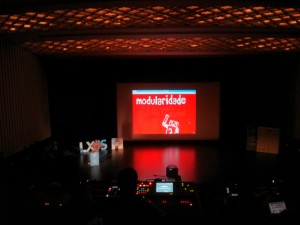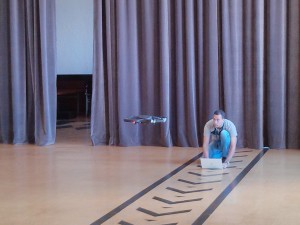Last week I spent some days in Lisbon attending LXJS (Lisbon JavaScript). This was the second edition of this JavaScript conference. Considering the quality and the very positive feedback of the first edition I decided not to miss it this year.
The event was hosted at Cinema São Jorge, an old-style cinema theather located at the heart of Lisbon. It was two days packaged of talks about JavaScript. The event is structured in one-single track. There’s not much detail about the specific contents of each talk until the very last day. Instead of listing each talk individually, they are organized by topic (infraestructure, gaming, robots, etc). I particularly liked this approach. First, no stress about what talk to go. Second, although you may not be interested in a topic, attending all talks can give you a good understanding of what’s going on in JavaScript nowadays. And if you’re not interested in a particular topic anyway, you can skip the whole block.
The quality of the talks were very good in general. Some of the speakers had participated in other JavaScript events, like JSConf EU, and most of them were international speakers, which gives an idea of the global scope of the event. Without further do, here’s a brief summary of the talks I found more interesting:
-
Jed Schmidts’ Thursday keynote. If you haven’t watched Jed Schmidt’s CSSConf talk you should rather stop what you’re doing right now and watch it (it’s just 8 minutes). Clever, witty and with sense of humor. His keynote at LXJS followed the same style.
-
Robert Nyman. Review of Firefox OS. Robert Nyman is a technology evangelist at Mozilla. Good review of the current state of Firefox OS.
-
Estelle Weyl. Web performance considerations in a mobile world. Good advices about how to improve performance of your mobile apps. Particularly interesting for web developers.
-
Laura Kalbag. Designing for accessibility. Good reminder of what to do and what not to do for improving websites design and accessibility. If you’ve read “Don’t make think” or follow some UX course like hackdesign, you maybe familiar with most of the concepts. Good review of tools at the end of the talk.
-
Jonahattan Lipps. Appium. Appium is functional testing environment for webapps and mobile. Don’t miss Jonahattan’s live performance with a guitar.
-
Tim Park. Nitrogen.js. Nitrogen is a framework that makes it easier to build connected real world devices and the applications that use them. Very interesting if you are keen on domotic. Park worked at Nest, so all his experience in domotic devices is built into the Nitrogen.
-
Dominic Tarr – What does “scalable” mean anyway? Good review at databases written in JavaScript, with a focus on LevelDB (which I didn’t know about).
-
Michal Budzynski. Gaming in JavaScript. Michal is a Firefox OS developer and JavaScript game developer. This talk, conducted like an arcade game, gives a review at his latest work on JavaScript game developing and some of his experiments. Very nice and enjoyable talk.
-
Mark Boas. HyperAudio. This is an idea that’s been around for a while. First time I heard about HyperAudio was like two years ago or so, if I remember correctly. It was good to see the effort is still alive, mostly pushed by people from Mozilla. To put it briefly, HyperAudio’s goal is to make audio a first-class citizen in the web. Think of all the audio available on the internet and how little of that content is still searchable and difficult to share. Imagine you would like to share a fragment of an interview with your favourite writter broadcasted by the BBC one-year ago. Still today, impossible to do.
-
Bill Mills and Angelina Fabro. JavaScript for Science. Good talk conducted by two speakers. Bill is a physicist working at Triumf and Angelina is a experienced Mozillian. This talk is about how much software engineering good practices, which are quite adopted in the developement of open-source, can help improving science software.
-
Alex Feyerke and Caolan McMahon. Hoodie. Presentation of the Hoodie framework, an interesting framework for rapid prototyping in JavaScript.
-
Hannah Wolfe. Ghost. Review of the current state of Ghost, a new blogging platform built in node.js. The project counted with funding from Kickstater and it’s currently available for downloading. It looks promising.
-
Vyacheslav Egorov. Performance and benchmarking. Review of what to do and what not to do when writing performance tests in JavaScript. Very nice and enjoyable to watch talk.
-
James Halliday. Modularidade para todos. Good insight about the anarchich, but operative, structure and organization of npm. Very fun talk.
-
Domenic Denicola. How to win friends and influence standars bodies. Title inspired by the classical book “How to win friends and influence people”. Denicola’s reflections and advices about how to interact with the different web communities (JS, Web) and keep moving the web forward. Denicola is the original author of the CommonJS specification about promises.
-
Raquel Velez. NodeBots. Good introduction to hacking on robots with JavaScript.
-
Andrew Hebbit. Nodecopter Hacks. Andrew is an organizer of many nodecopter events in the UK. In this talk gives a review of all the things he and other people have hacked on a nodecopter. Andrew also help with the NodeCopter event held the day after the conf.
There were some other interesting talks, specially on gaming, infraestructure and development but whether that may be interesting for you or not depends very much on your needs. This was just a brief selection of those I particularly enjoyed.
Lastly, I’d like to thank all the people involved in the organization of the event for their work, their time, the parties and for making that everything worked just perfectly; a big hug to all the people I met there during those two days and, last but not least, thanks to Igalia for sponsoring my attendance. I hope to be there again next year.
Please drop me a line if you have any feedback. Thanks!


